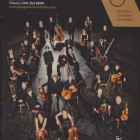Béatrice et Bénédict 2013Scottish Chamber Orchestra
Read more about the opera Beatrice and Benedick
This 2013/14 Season saw the Scottish Chamber Orchestra celebrating the 40th anniversary of its foundation. Three celebratory choral works were selected for performance in conjunction with the SCO Chorus,
The season began with a concert performance of Berlioz's effervescent comic masterpiece, Béatrice et Bénédict. In December came the Bach B minor Mass. This was followed in April by Mozart's Mass in C minor. Finally, to end this celebratory season in May came Beethoven's Choral Symphony.
Nearly eighty years after receiving its British premiere in Glasgow, Berlioz's final operatic masterpiece resurfaced. Better late than never, even if only in concert form. Fortunately the lengthy dialogue was cut altogether, and the wonderful music was allowed to make its full effect in a performance of regular concert length.
Karen Cargill has already shown in other works that she is an excellent Berlioz stylist, and she is also adept at comedy. The rest of the cast was equally accomplished, including a welcome return by Kenneth Tarver, a wee while since his success as James V in The Lady of the Lake. His voice is always sweet-toned, with a fearless approach to the high-flying writing. Sally Matthews and Brindley Sherratt also now have thriving international careers, and have worked infrequently in Scotland. The role of Ursula, beautifully voiced by Kathleen Wilkinson, may be dramatically less significant than in Shakespeare, but her musical contribution is vital to two of the greatest sequences - the wonderful nocturne duet that ends the first act, and the trio that provides the emotional centre of the second. The lively trio for the men also made an effect, with Brindley Sherratt and Ashley Riches having a chance to shine.
This was a special autumnal treat given the current form shown by the SCO and Ticciati. The one truly familiar element, the effervescent overture, was given a lovely performance with an unusual degree of subtlety to contrast with the fizz. The chorus also has some excellent opportunities that were well taken. The absence of dialogue eliminated the tiresome aspects of Somarone's part, leaving the attractively melodic elements of the music, well presented by Lionel Lhote. The only drawback in the form of presentation came from the rather perfunctory closing of the plot, with the men having little to do in the second act.

